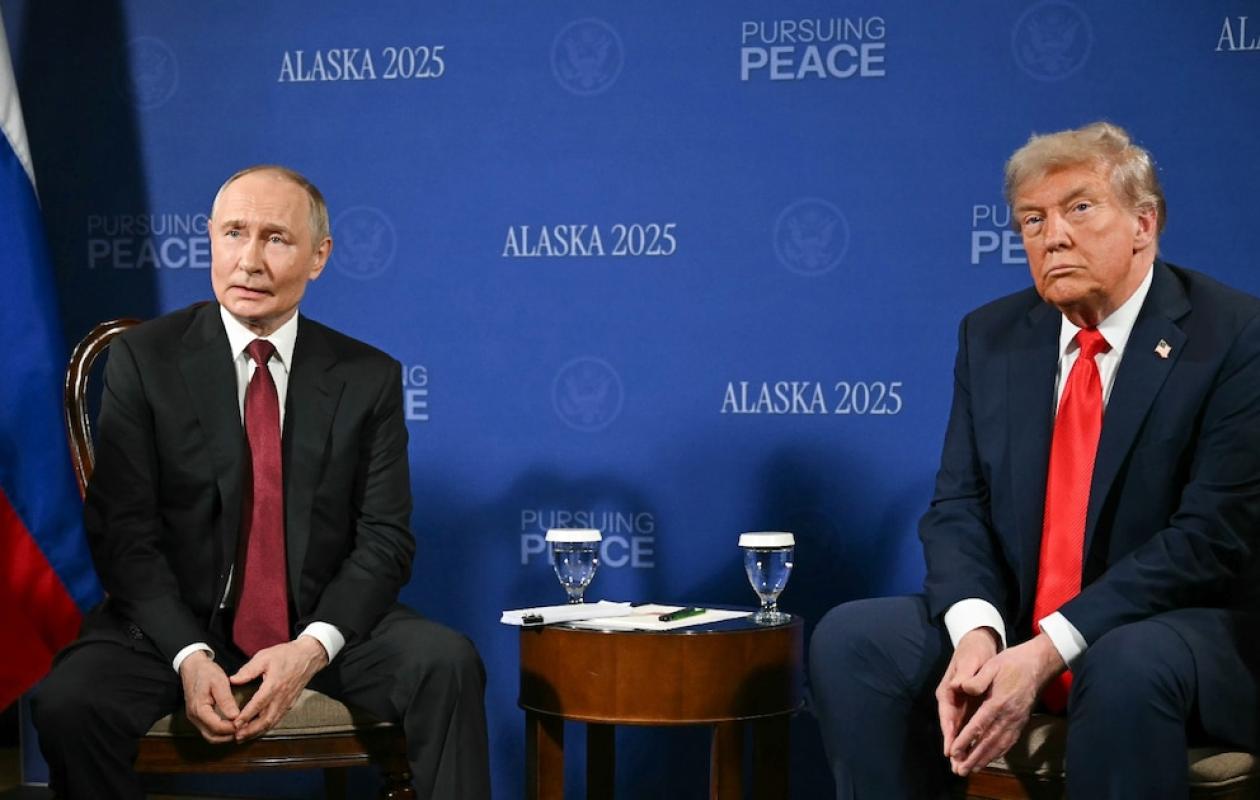
Trump et Poutine achèvent une réunion de près de trois heures
Donald Trump and Vladimir Putin concluded nearly three hours of talks in Alaska on Friday, where they may have sealed the fate of Ukraine or even shaped the diplomatic and security future of Europe as a whole.
"The small-scale negotiations have ended," the Kremlin said on Telegram, without it being immediately clear whether there would be further discussions.
Meanwhile, reporters were invited into the press room at Elmendorf-Richardson Air Force Base, where the two leaders are scheduled to hold a joint press conference, against a blue backdrop reading "Pursuing Peace."
The impulsive American president had warned that he would slam the door very quickly in the event of an impasse, a threat he therefore did not carry out.
The conversation between the two leaders, each accompanied by two senior officials, began shortly after 11:30 a.m. local time (7:30 p.m. GMT), and lasted nearly three hours.
The high-stakes summit opened with a warm and carefully choreographed welcome for Vladimir Putin, who is making a spectacular return to the international stage after more than three years of conflict sparked by the Russian invasion of Ukraine.
Donald Trump even briefly applauded as his Russian counterpart walked toward him on the tarmac.
Handshakes, smiles and pleasantries followed, in a display of American military might, with state-of-the-art fighter jets lined up beside the red carpet and flying overhead.
Unusually, Vladimir Putin then climbed into Donald Trump's armored car where they had a brief tête-à-tête.
Their first working meeting was originally planned to follow this model, but the format was expanded to include, on the American side, Secretary of State Marco Rubio and Steve Witkoff, special envoy to Russia, and on the Russian side, Foreign Minister Sergei Lavrov accompanied by Yuri Ushakov, diplomatic advisor.
This could change the psychological dynamics of this meeting, which Ukraine and the Europeans fear above all will allow Vladimir Putin to manipulate his American counterpart.
The first person concerned but notably absent from this meeting, Ukrainian President Volodymyr Zelensky declared that he was "counting" on Donald Trump to put an end to the conflict.
Russian soldiers "continue to kill on the day of negotiations," he lamented, while the Ukrainian army announced Friday that it had recaptured six villages that Russian units had seized in recent days, during a particularly rapid advance.
If his first face-to-face meeting since 2019 with the Kremlin's ruler goes well, Donald Trump, who dreams of becoming a Nobel Peace Prize winner, assured that "this meeting (would) open the way to another," a three-way meeting with Volodymyr Zelensky.
The choice of Alaska is full of symbolism.
This vast territory was ceded by Russia to the United States in the 19th century. It later became an outpost during the Cold War, when America and the Soviet Union glared at each other across the Bering Strait.
The Ukrainian president and European leaders will have to wait for the unpredictable American president to inform them of the content of his meeting, as he promised.
Vladimir Putin "has the opportunity today to agree to a ceasefire" in Ukraine, German Chancellor Friedrich Merz stressed.
This peace seems very far away, as the positions of the two belligerents appear irreconcilable.
Russia is demanding that Ukraine cede four partially occupied regions (Donetsk, Lugansk, Zaporizhzhia and Kherson), in addition to Crimea annexed in 2014, and that it renounce Western arms deliveries and any membership in NATO.
This is unacceptable to kyiv, which wants an unconditional and immediate ceasefire, as well as future security guarantees.
Donald Trump, who has been pitting the two belligerents against each other since the Russian invasion of Ukraine, speaks of a "give and take" in territorial matters.
While the Russian president and the American president have a common obsession, that of never appearing in a position of weakness, their approaches to international power relations are very different.
For Donald Trump, a former real estate developer who became famous thanks to a reality TV show, it's all about quick negotiation and well-executed bargaining to arrive at a deal that's bound to be advantageous for him.
Where Vladimir Putin, a former KGB officer trained in psychological warfare, thinks long-term, evoking the historical destiny of a "great Russia" that he would like to reconstitute.
AFP
Commentaires (0)
Participer à la Discussion